CABG patients also have lower risk of reintervention and non-fatal heart attack
Newswise — Chicago—People with diabetes mellitus who undergo heart bypass surgery for multiple blocked arteries have a significantly better 5-year-survival rate than diabetic patients who undergo angioplasty with drug-eluting stents (DES), according to a study published in the November 2012 issue of The Annals of Thoracic Surgery.
Key Points
- Bypass surgery offers people with diabetes better long-term survival than stents.
- People with diabetes who receive stents, even drug eluting stents, are more likely to have recurrent chest pain, require reintervention, and suffer non-fatal heart attacks.
- Cardiothoracic surgeons and cardiologists can work together to help people with diabetes determine the best procedure for them.
The study, by researchers at Israel’s Tel Aviv Sourasky Medical Center, is the first comparative effectiveness demonstration of coronary artery bypass grafting (CABG) surgery using both internal thoracic arteries versus percutaneous coronary intervention (PCI) with DES in patients with diabetes.
Yaron Moshkovitz, MD, Rephael Mohr, MD, and colleagues reviewed 5-year outcomes for 226 patients who underwent bilateral internal thoracic artery (BITA) grafting with outcomes for 271 patients who underwent PCI with DES. They found that BITA patients had a 13% greater survival rate, as well as a lower risk for non-fatal heart attacks, recurrent chest pain, and future re-interventions. Additionally, they found that the more stents that were used, the greater the risk of a major cardiovascular event.
“The long-term benefit of BITA bypass graft surgery is probably related to the protection provided by CABG conduits that bypass the blockages and protect against future blockages,” said Dr. Mohr. “Protection from recurrent coronary events due to disease progression cannot be achieved by the stents placed in the coronary arteries during heart catheterization.”
People with diabetes mellitus, a disease that affects an estimated 14.5 million Americans, are at higher risk for death from coronary artery disease (CAD) and face increased risks from procedures to treat CAD, according to the National Heart, Lung, and Blood Institute. These risks include kidney failure, stroke, and infection.
CAD in diabetic patients is more diffuse and progresses faster than CAD in people who do not have diabetes. Dr. Mohr explained that coronary arterial blood vessels in diabetic patients are smaller, which increase the risk of new blockages of the blood vessels after treatment with stents.
“We recommend the surgical option to our patients with diabetes and significant coronary artery disease because bypass will promise them longer survival with a lower chance for return of angina or additional procedures to address blockage,” said Dr. Mohr. “They will also have a reduced chance of heart attack and cardiac-related mortality.”
Future of CAD Treatment for Patients with DiabetesPeter K. Smith, MD, Division Chief of Cardiovascular and Thoracic Surgery at Duke University Medicine in Durham, NC, said awareness of this study is very important.
“This study indicates that, in general, bypass surgery is preferred for patients with diabetes,” said Dr. Smith, who was not involved with the research. “The durability of bypass grafts compared to DES is especially important because diabetic patients more frequently have all of their coronary arteries blocked, the disease in the arteries is more serious in nature, and they frequently have had a heart attack in the past.”
Dr. Mohr said he hopes his research will encourage surgeons to make more considerable use of arterial grafts, especially of the internal thoracic arteries, in diabetic patients. “It is also possible that this paper will influence the interventional cardiologists to discontinue implantation of stents in diabetic patients with a blockage of more than one heart vessel,” he said.
Dr. Smith advocates a heart team approach, where surgeons and cardiologists work together to recommend treatment for their patients. “Patients with diabetes should have the benefit of this type of multidisciplinary consideration,” he noted. “Patients with diabetes should be aware of their choices, and if bypass surgery is not recommended, they should ask why.”
Founded in 1964, STS is a not-for-profit organization representing more than 6,500 cardiothoracic surgeons, researchers, and allied health professionals worldwide who are dedicated to ensuring the best possible outcomes for surgeries of the heart, lung, and esophagus, as well as other surgical procedures within the chest. The Society’s mission is to enhance the ability of cardiothoracic surgeons to provide the highest quality care through education, research and advocacy.
The Annals of Thoracic Surgery is the official journal of STS and the Southern Thoracic Surgical Association.
MEDIA CONTACT
Register for reporter access to contact detailsCITATIONS
The Annals of Thoracic Surgery (November 2012)
